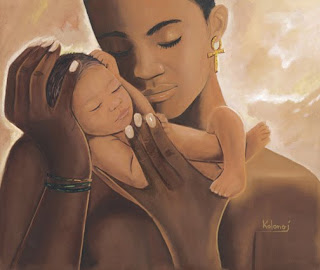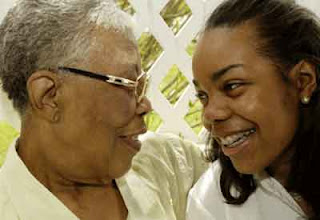
While reading Elaine Richardson's "To Protect and Serve": African American Female Literacies the beginning was the most captivating. The opening kept my attention and was on my mind throughout the rest of the reading. The term "Mother Tongue stood out to me. I am still wondering if there is a certain definition that can clearly give an explanation of the essential meaning of the term. According to Elaine Richardson, “The term mother tongue can be understood on several levels” (677).
From the reading I can basically argue a definition of mother tongue in my own words. My level of understanding of mother tongue would be that is a type of literacy that is taught through the tongues of maternal figures. Elaine Richardson writes, “Woman is the child’s first teacher, who protects it even in her womb and begins to socialize it” (677). This quote helps me support my reason for composing a certain definition of mother tongue. She also adds, “But, more basically, our language, our mother tongue, is at least partly how we know what we know.” (677)
I agree with Elaine Richardson’s arguments about the concept of mother tongue literacy. There are different types of literacy we are introduced to throughout our lives. The main literacy that I believe most of us are taught first is maternal literacy. The nurture of a mother to her child is a wonderful and never-ending experience because it is full of knowledge that sticks with you which allows you to pass it down to your own children. I still learn a lot from my mother just from watching her interact with my siblings and I. As a young child, your mother was your first teacher. Everything your mother taught you was what you took with you on the first day of school and continued to add on to the knowledge that was given to you from mother tongue literacy.
 ng and dragging but above all interesting stories and experiences of my grandmother and mother, I have realized by purpose in life. “Should we respect our language and ways of knowing as little girls or in our homes as we develop into women? Or should we gradually have our minds erased with each passing year of formal school?” This quote taking from the article raises an important question. I believe we shouldn’t. If we let the American literature control our thinking and lose our knowledge that we have gained from our African American women we will be nothing. Think about it. A doctor can’t read the manual of an architect to do its work and we as African American can’t be filled with the “Guide to Living an American Life” to understand our purpose and who we are as African American women who protect and serve!
ng and dragging but above all interesting stories and experiences of my grandmother and mother, I have realized by purpose in life. “Should we respect our language and ways of knowing as little girls or in our homes as we develop into women? Or should we gradually have our minds erased with each passing year of formal school?” This quote taking from the article raises an important question. I believe we shouldn’t. If we let the American literature control our thinking and lose our knowledge that we have gained from our African American women we will be nothing. Think about it. A doctor can’t read the manual of an architect to do its work and we as African American can’t be filled with the “Guide to Living an American Life” to understand our purpose and who we are as African American women who protect and serve!
